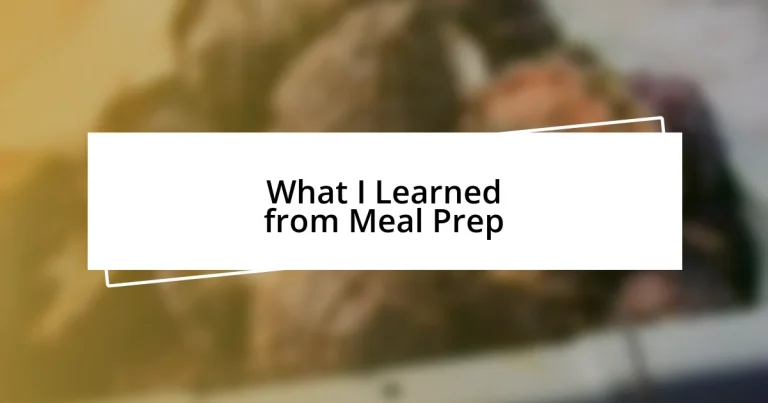Key takeaways:
- Meal prepping promotes healthier eating habits, improves time management, and reduces food waste, ultimately empowering better dietary choices.
- Essential tools for efficient meal prep include sharp knives, a reliable food scale, and quality storage containers, enhancing organization and precise portioning.
- Overcoming common challenges like motivation and food fatigue can be achieved through meal planning creativity and setting designated prep days, turning cooking into an enjoyable ritual.
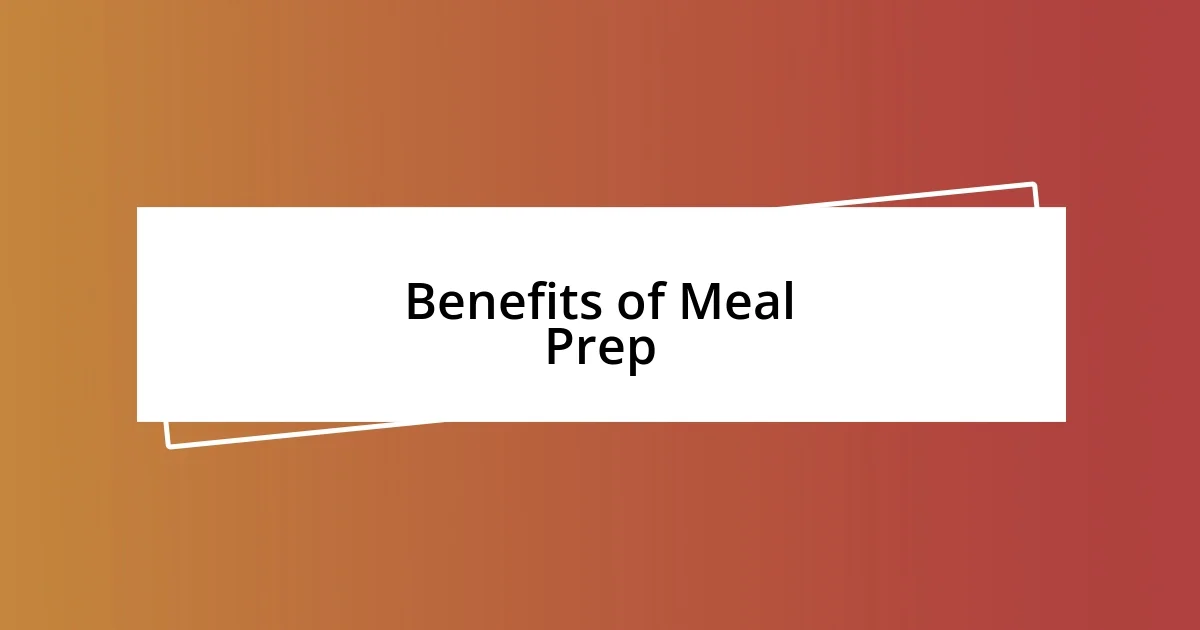
Benefits of Meal Prep
Meal prepping has transformed my approach to both cooking and eating. I recall a time when my evenings were filled with takeout menus and stressful decision-making about dinner. Now, with prepped meals on hand, I enjoy more calm and focus during the week. Isn’t it amazing how a little planning can change our daily routines?
One of the standout benefits is how meal prep promotes healthier eating habits. I used to grab whatever was convenient, often leading to unhealthy choices. Now, knowing I’ve set aside nutritious, homemade options, I feel empowered to make better decisions. Have you ever noticed how cooking in bulk means more control over ingredients and portion sizes? It’s like having a secret weapon against temptation!
Budget-wise, meal prepping has been a game changer. It not only saves me time but also cuts down my grocery spending. When I eliminated impulse buys, I found that planning my meals in advance allowed me to utilize what I already had, minimizing waste. Have you ever calculated how much money you might save by not throwing away food? The results can be surprisingly eye-opening!
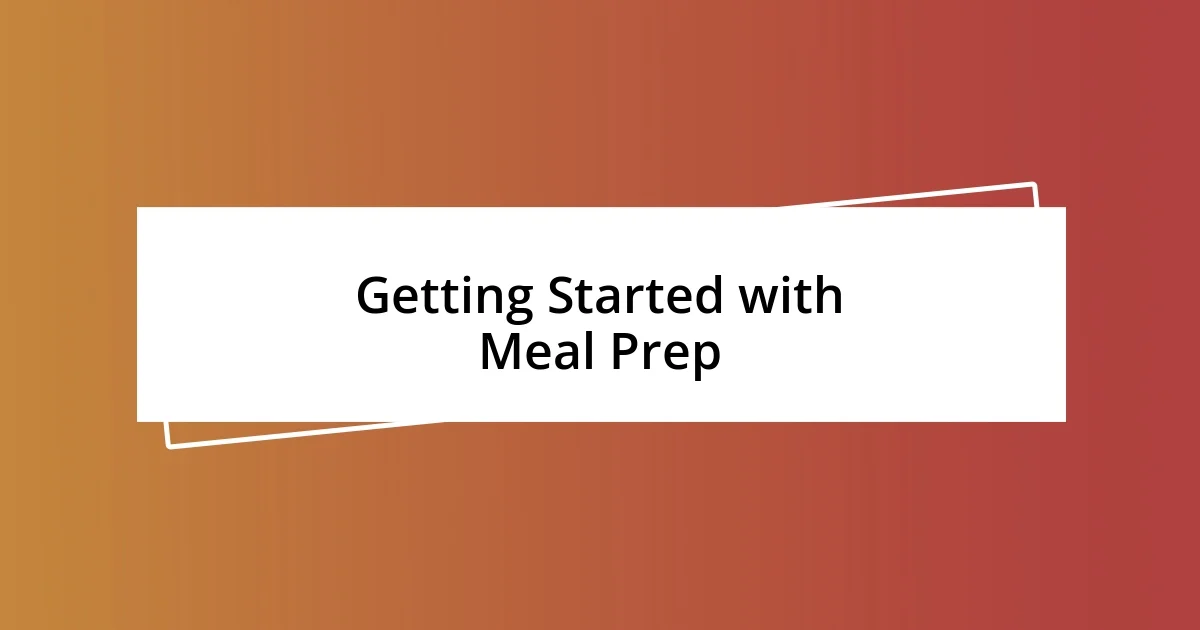
Getting Started with Meal Prep
Getting started with meal prep can seem daunting, but I’ve learned that taking small steps makes all the difference. Initially, I was overwhelmed by the idea of dedicating hours to cooking, but I quickly discovered that even just planning a few meals for the week can save time and energy. It felt liberating to have a plan in place, knowing I wouldn’t have to scramble for dinner at the last minute.
Here’s a simple checklist to help you embark on your meal prep journey:
- Choose a Day: Select a day that suits your schedule to do the bulk of your cooking.
- Plan Your Meals: Make a list of recipes that excite you. It’s easier to stay motivated when you enjoy what you’re making!
- Shop Smart: Create a grocery list based on your meal plan to avoid impulse purchases.
- Prep Ingredients Ahead: Wash and chop veggies or marinate proteins to save time when you start cooking.
- Invest in Containers: Get some good-quality, portioned containers to store your meals efficiently.
Once I embraced these steps, I felt a shift in how I approached cooking—turning mealtimes into an enjoyable process rather than a chore.

Planning Your Weekly Meals
When it comes to planning my weekly meals, I’ve found that simplicity and creativity are essential. Every Sunday, I sit down with a cup of coffee and sketch out my meals for the week. This ritual not only sets my culinary intentions but also gives me a chance to experiment with new recipes. Have you ever savored the joy of flipping through a cookbook, discovering dishes you never knew you’d love? I’ve turned that enjoyment into a weekly event, allowing me to keep things fresh and exciting.
I usually categorize my meals: breakfast, lunch, and dinner, making it easier to see the balance of nutrients I’m incorporating. Planning different proteins, veggies, and grains helps me maintain variety, and I make sure to include at least one dish I can batch cook. One memorable week, I decided on a Mexican theme; imagine the flavor fiesta with burrito bowls on Monday, tacos on Tuesday, and a zesty salad on Wednesday!
To organize my meal planning, I’ve created a simple comparison table that illustrates how I choose my meals based on time and complexity. This visual reminder has been a game-changer! It keeps me accountable and makes meal prep a breeze:
| Meal Type | Preparation Time |
|---|---|
| Breakfast | 10-15 minutes |
| Lunch | 20-30 minutes |
| Dinner | 30-60 minutes |
| Batch Cooked | 2 hours |
I’ve discovered over time that planning my meals isn’t just about food. It’s a way to manage my week and build a rhythm to my days. I often reflect on how easy it is to let chaos take over when the fridge is empty or when I’m scrambling for something to eat. By consistently planning my meals, I not only ensure I’m well-fed, but I also carve out more time in my week to engage in activities I love—like reading or spending time with friends. Can you picture how liberating it feels to have a meal ready, allowing spontaneity in other areas of life? It’s been a revelation for me!
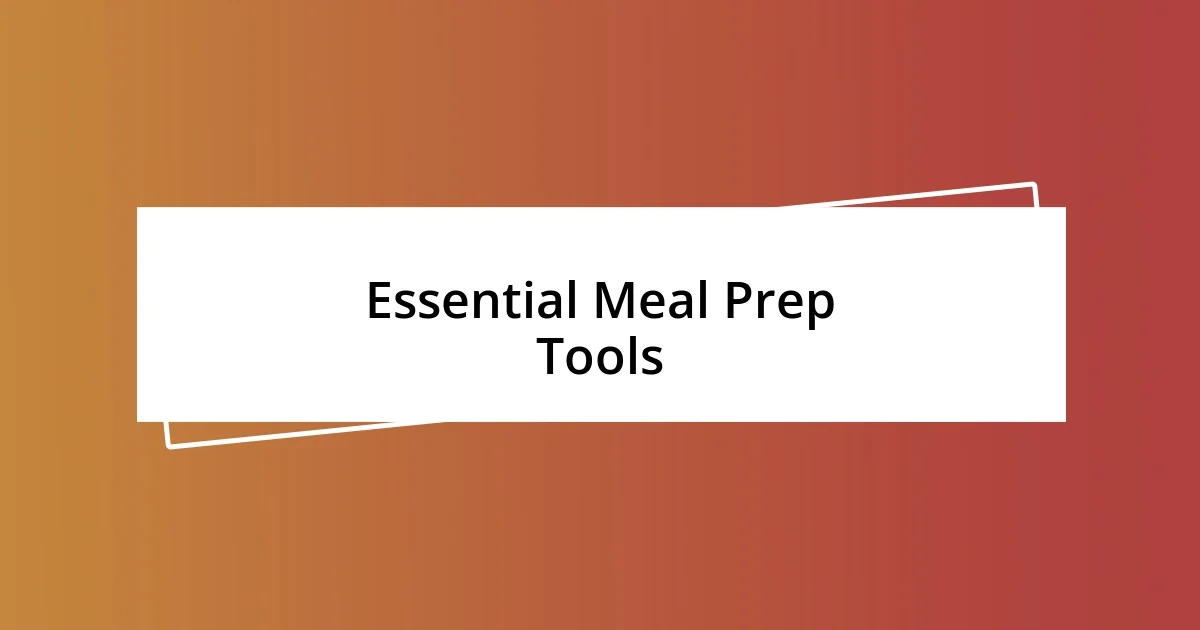
Essential Meal Prep Tools
When it comes to meal prepping, having the right tools is crucial. I remember the first time I embarked on this journey; I quickly learned that having sharp knives and a good cutting board made all the difference. Imagine the frustration of struggling with a dull knife while trying to chop vegetables quickly—it’s not only inefficient but can be downright dangerous! Investing in a high-quality chef’s knife transformed my prep time, allowing me to breeze through chopping tasks.
Next on my must-have list is a reliable food scale. This might seem like an unnecessary tool, but trust me, it can elevate your meal prep game. It’s all about precision, especially when trying to manage portion sizes or calorie counts. I recall using my scale for the first time while measuring out grains for a recipe. What I thought would be just another step turned into an enlightening experience; I was shocked at how visually misleading portion sizes could be! With a scale, I felt more in control of my meals and aware of my nutrition.
Lastly, don’t overlook the power of quality storage containers. Early on, I found myself grappling with mismatched lids and containers that leaked—what a mess! Switching to stackable, BPA-free containers has been revolutionary. I find that having clear containers not only helps me locate meals easily but also makes everything feel organized. Plus, I enjoy the satisfaction of seeing my colorful, prepared dishes lined up in the fridge, just waiting to be grabbed. Have you ever opened your fridge and felt a wave of pride at your meal prep skills? That moment is worth all the effort!
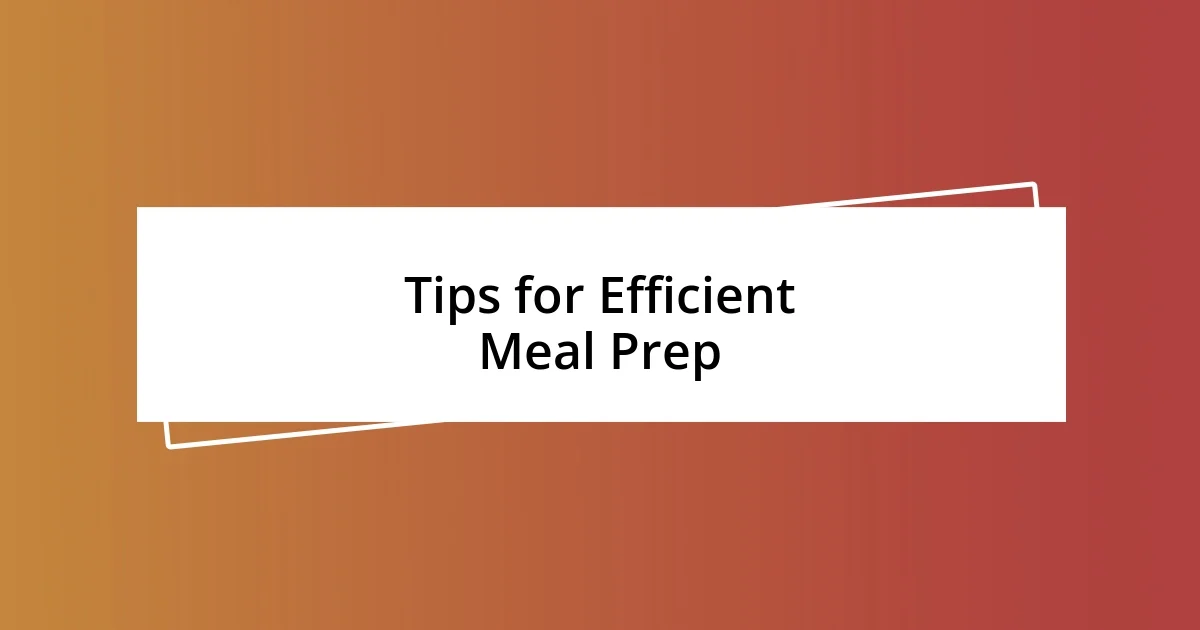
Tips for Efficient Meal Prep
One of the biggest game-changers in my meal prep journey has been creating a detailed shopping list before heading to the grocery store. I remember my first few trips where I wandered aimlessly, unsure of what I really needed. That led to impulse buys that cluttered my fridge and my resolve. Now, I categorize items by sections in the store, which not only saves time but also helps me avoid unnecessary purchases. Have you ever felt the relief of sticking to your list and saving money? It’s like a mini victory every time!
Another tip I swear by is cooking in bulk and freezing portions. There was a week when I made a giant pot of chili and froze several servings. On days when I felt too exhausted to cook, it was amazing to pull out a ready meal that tasted just as good as the day I made it. I can’t stress how valuable it is to have go-to meals on hand, especially when life gets hectic. Have you experienced the joy of a warm homemade meal, just moments after arriving home? It’s those little comforts that make meal prep worth it.
Finally, I’ve learned the importance of keeping a meal prep journal. I jot down what worked, what didn’t, and any modifications that appealed to my taste buds. Reflecting on my past meals not only brings back pleasant memories but also helps me refine my skills over time. Have you ever flipped through your notes and felt a rush of excitement about all the flavors you want to revisit? It’s like having a personalized cookbook right at my fingertips. Each entry reminds me that meal prep is a journey, and every experience adds to my culinary tale.

Storing and Reheating Meals
Storing meals effectively is a key component I’ve come to appreciate over time. Early in my meal prep journey, I struggled with a chaotic fridge, juggling several Tupperware containers, some with mystery contents. I vividly remember finding a container in the back that had sprouted an unintentional science experiment! It became clear to me that labeling and organizing my meals not only saved me from surprise discoveries but also turned meal planning into a seamless process. Have you ever opened your refrigerator to find neatly organized meals instead of a hodgepodge of mismatched containers? It’s a game changer.
When it comes to reheating, I prefer using the microwave, as it quickly brings my meals back to life. However, I’ve learned that not all containers are microwave-friendly—a lesson I had to learn the hard way after nearly melting a plastic dish. Now, I opt for glass containers, which not only withstand the heat but also keep my food tasting fresh. I always find joy in the moment when I take a dish from the microwave, feeling the warmth radiating through. Have you ever experienced the comforting aroma of a homemade meal wafting through your kitchen? It’s like a hug for your taste buds!
Finally, I can’t stress the importance of portioning. I always prepare individual servings to make my life easier. This way, when I’m in a rush, I simply grab a portion and go. One hectic day, after a long work shift, I was thrilled to find my pre-portioned pasta ready in just minutes. It felt like my future self had set me up for success! What are some of your favorite quick meals? Finding that balance between convenience and freshness has made all the difference in maintaining my meal prep routine.
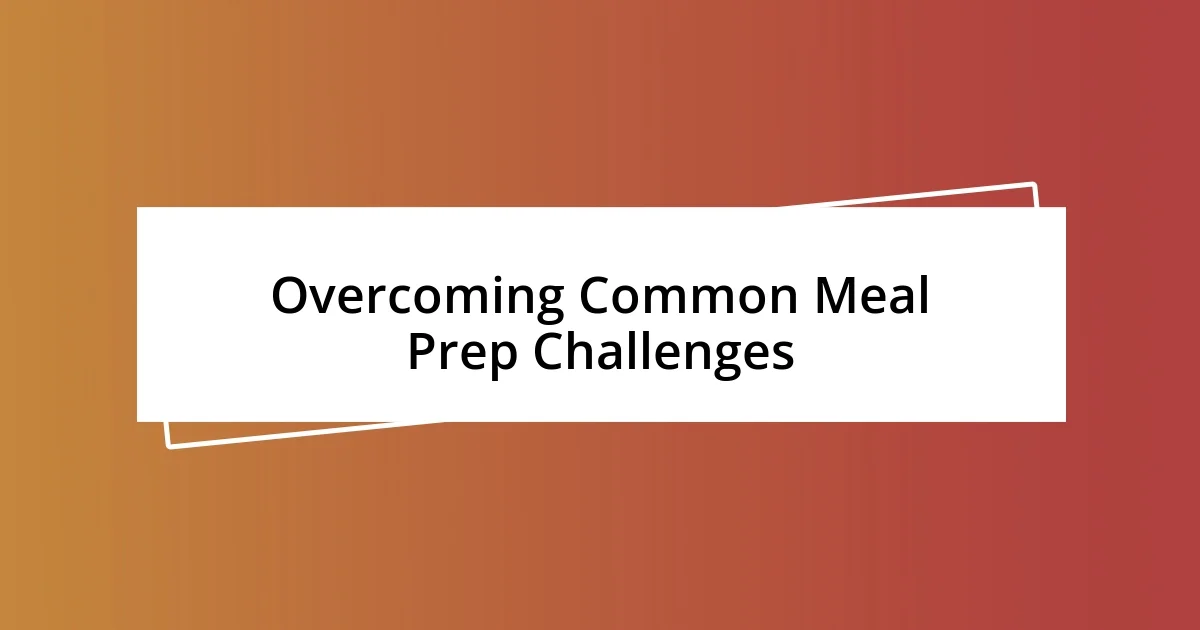
Overcoming Common Meal Prep Challenges
Sometimes, the biggest challenge in meal prep is staying motivated. I remember when I first started, I was all gung-ho for a few weeks, but then my enthusiasm waned. I found that setting a specific meal prep day each week helped keep my momentum going. By treating it like a fun ritual or even a mini cooking party with music and a glass of wine, I turned something that felt like a chore into an enjoyable experience. Have you tried making meal prep a social event? It can really change your perspective!
Another hurdle I faced was dealing with food fatigue. After eating the same meals for a couple of days, I found myself bored and craving something different. I learned to combat that by incorporating variations into my recipes. For instance, I’d make a base dish, like quinoa, and then switch things up with different dressings or toppings throughout the week. This little twist not only kept my meals interesting but also made me excited to dive into my leftovers. Isn’t it amazing how a simple change can revive our enthusiasm for a dish?
Lastly, budgeting can often feel like a tightrope walk. I used to overspend on fancy ingredients that sounded good at the time but often ended up unused. To tackle this, I started to plan my meals around sales and seasonal produce, and I even joined a local co-op for fresh veggies. This approach not only reduced my grocery bill but also connected me with my community. I felt good knowing I was supporting local farmers. How do you strategize your grocery shopping to fit your budget? Finding ways to make meal prep financially feasible has truly changed how I approach cooking.












